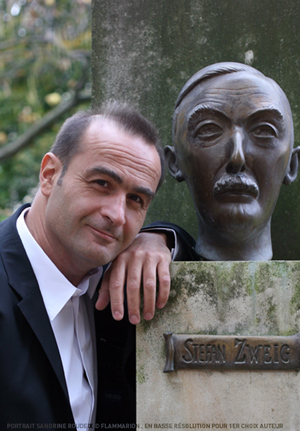



Internationally known French novelist Laurent Seksik will conclude a week at Fredonia devoted to Stefan Zweig – the Austrian author and biographer who reached the height of his career in the 1920s and 1930s as one of the world’s most popular authors – in a program to be presented at on Wednesday, Oct. 22, at 6 p.m. at Rosch Recital Hall.
 |
| Dr. Laurent Seksik |
Dr. Seksik will give the 3rd Stefan Zweig Lecture, “Physician as Writer: How Stefan Zweig Changed my Life,” which will draw on Seksik’s lifelong interest in Zweig. He is the author of the bestselling book, “The Last Days of Stefan Zweig,” which tells the story of Zweig’s final months.
A manuscript exhibit, “Stefan Zweig and World War I,” prepared by graduate students in the Department of English, will open on Thursday, Oct. 16 at 3 p.m., in Reed Library, and will portray the Austrian author’s dramatic transformation from being a propagandist supporting the war towards pacifism. The exhibit, a select display of archival items including letters from authors Erich Maria Remarque and James Joyce from the library’s renowned Stefan Zweig Collection, will run through Dec. 15.
Fredonia’s week-long celebration will also include a staged reading of the play adapted from Seksik’s book on Tuesday, Oct. 21 at 7:30 p.m. in Bartlett Theatre, directed by Department of Theatre and Dance Associate Professor Jessica Hillman, which marks the American premiere of the play. Performances of the play have been presented in Paris, France, and Tel Aviv, Israel, with a show slated for Munich, Germany, in 2015. Copies of Seksik’s book will be available for purchase at the Fredonia campus bookstore with a book signing opportunity immediately following the lecture.
Born to Jewish parents in Vienna, Austria-Hungary, in 1881, Zweig utilized pen and paper to express his pacifist beliefs during the outbreak of World War I. In 1934, following Adolf Hitler’s rise to power in Germany, Zweig fled Austria to live in London for a time, followed by New York City and lastly Petrópolis, Brazil, north of Rio de Janeiro. Becoming increasingly dejected by the rise of intolerance and Nazism, Zweig committed suicide hand-in-hand with his wife on Feb. 23, 1942, the day after completing his autobiography.
Seksik, who is a practicing physician in Paris, devotes passion to both medicine and writing. Many of his bestselling novels have earned international acclaim, having been translated into many languages.
For more information regarding Seksik’s lecture or Fredonia’s Stefan Zweig Lecture Series, contact Department of English Associate Professor Birger Vanwesenbeeck at vanweseb@fredonia.edu. More information about the Zweig collection can be found at http://www.youtube.com/watch?